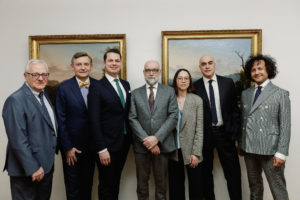The Visual Artists’ Resale Right (“ARR”), an Overview of its Application in the EU and in Switzerland.
I. Definition
The Artists’ Resale Right (“ARR”) consists in the entitlement of visual artists to receive a royalty (i.e. a share
of the proceeds) on the re-sale of their original works, provided that an art-market professional is involved in
that sale and the sale price is above a specified minimum threshold.
The ARR is intended primarily to make sure that visual artists share in the value of the works they created, to
redress the unfairness between visual artists and creators who benefit from the sale of copies of their works
and to promote artistic creation. ARR forms an integral part of copyright and is an essential prerogative for
visual artists. The major criticism moved against the ARR is that it benefits only a handful of artists who are
already successful by themselves; however, ARR is not meant to be a welfare scheme to help artists in need.
II. ARR in the EU
The ARR has been harmonized in the European Union with the adoption of the Directive 2001/84/EC of 27
September 2001, which entered into force in its entirety on 1st January 2012. The ARR under the Resale Right
Directive is due when:
– an original work of art, meaning a work “of graphic or plastic art such as pictures, collages, paintings,
drawings, engravings, prints, lithographs, sculptures, tapestries, ceramics, glassware and photographs made
by the artist himself” or a copy considered as an original work of art because it has “been made in limited
numbers by the artist himself or under his authority”; such copies will normally have been numbered, signed
or otherwise duly authorised by the artist (art. 2 of the Resale Right Directive);
– by an artist who is a national of a Member State (or is a national of a third country and has a habitual
residence in a Member State, if the national legislation of said Member State so foresees) or of another
country under the condition of reciprocity (art. 7 of the Resale Right Directive);
– is resold through, as sellers, buyers or intermediaries, art market professionals, such as salesrooms, art
galleries and, in general, any dealers in works of art (art. 1 of the Resale Right Directive);
– for a minimum sale price Member States are allowed to set, which may not under any circumstances exceed
EUR 3’000 (art. 1 of the Resale Right Directive). This threshold amounts to EUR 400 in Germany (§26 of the
UrhG), to EUR 3’000 in Italy (art. 150 Legge sulla protezione del diritto d’autore), to EUR 750 in France (art.
R122-5 Code de la Propriété Intellectuelle) and to the equivalent in GBP of EUR 1’000 in UK (par. 12.3 (b) of
the Artist’s Resale Right Regulations 2006);
– during the term of protection, which runs for the life of the author and for 70 years after his death (art. 8
of the Resale Right Directive in relation with art. 1 of the Council Directive 93/98/EEC of 29 October 1993
harmonizing the term of protection of copyright and certain related rights).
The ARR is pa
buyer or the intermediary are liable alone or shall share liability with the seller for the payment of the royalty
(art. 1.4 of the Resale Right Directive).
The Resale Right Directive foresees a sliding-rates grid set forth in its art. 4: (a) 4 % for the portion of the sale
price up to EUR 50’000; (b) 3 % from EUR 50’000,01 to EUR 200’000; (c) 1 % from EUR 200’000,01 to EUR
350’000; (d) 0,5 % from EUR 350’000,01 to EUR 500’000; (e) 0,25 % for the portion of the sale price exceeding
EUR 500’000. The maximum resale royalty is capped at EUR 12’500, which would be due on a re-sale price of
EUR 2’000’000.
The ARR does not apply to private sales, i.e. sales made between persons acting in their private capacity
without the participation of an art market professional.
III. ARR in Switzerland?
Switzerland does not provide for an ARR in its legal system, even though there have been at least four
attempts by Swiss members of the parliament, to introduce the ARR in Switzerland in the last 20 years.
As a consequence, artists who are Swiss nationals, as a general rule, do not benefit from the EU resale right
provisions. There being no ARR in Switzerland, Swiss artists cannot invoke the application of the principle of
reciprocity laid down in art. 7 of the Resale Right Directive. There are, however, a few exceptions for Swiss
artists residing in the EU. In France, under art. r122-4 of the Code de la propriété intellectuelle, artists from
third countries, like Switzerland, may be entitled to a royalty payment if they have been resident in France for
at least 5 years and, during their artistic career, have participated in French artistic life..
Italian law (art. 146 c.
2 of the Legge sulla protezione del diritto d’autore) provides for the equal treatment of Italian artists and
artists who are nationals of third countries residing in Italy. Artists who are permanent residents of the
Netherlands qualifies, as well. UK and Germany, on the contrary, do not have similarly favorable provisions.
IV. ARR and the Art Market Professionals
Generally speaking, the art trade, especially in UK, expressed serious concerns when the ARR was harmonized
in the EU. The arguments voiced by art market professionals against the ARR encompass:
i. the danger of sales diversion due to unfair competition from galleries, art dealers and auction
houses based in jurisdictions where no such royalty exists, such as, to cite only the major art markets,
the USA, Switzerland, China and Hong Kong;
ii. the increased transaction costs; deriving from the royalty and/or the absorption of the royalties’
cost by the art market professionals, would negatively impact on the volume of deals concluded or
on the margins of the art trade;
iii. the purchase of artworks from young artists by dealers would dry up, favouring consignment
agreements with sale or return clauses instead;
iv. the unfairness of the fact that the resale right is payable irrespective of any profit made by the art
market professional, i.e. ARR is payable even though a work of art is sold at a loss;
v. the so-called cascade effect, or double-payment effect, affecting works bought and sold in quick
successive related transactions, before being sold to a final collector;
vi. the administrative burden and therefore the costs associated with the paperwork necessary to
comply with the ARR. These administrative tasks involve, on the one hand, the communication of
the sale’s details and the payment of the royalty to the collecting society in charge, dealt with by the
art market professional and, on the other hand, the processing of the notification, the finding of the
artists or their heirs and the payment of the royalty, which are the responsibility of the collecting
societies.
The ARR affects the primary and the secondary art market in different manners: the primary art market is
almost spared, provided that the “first” sales are structured in the appropriate way, i.e. a direct sale from the
artist to the collector, while the art market professional involved acts as a broker. The secondary market on
the other hand, especially for well-known international artists, may experience troubles.
V. ARR and the Risk of Sales Diversion
The Resale Right Directive apparently does not foresee the application of the royalty to sale contracts for art
works concluded outside the EU, even if persons residing in the EU are involved. According to Matthias
Weller, if all the relevant elements of the sale are agreed upon outside the EU, e.g. at an Art Fair in
Switzerland (the work of art, the price and any other subjectively essential element of the deal) and the
transfer of title occurs in Switzerland, no resale right royalty in the EU is due.
However, the ARR represents one – and not the highest – of the many transaction costs imposed on all market
participants and pales in comparison to others costs, such as the hammer’s fees charged by auction houses
or the indirect taxation (VAT). The cap at EUR 12’500 foreseen by the Resale Right Directive represents a good
compromise to fend off any tendency to divert sales in countries where the ARR does not apply.
Lugano, 10th April 2019
This is an excerpt of a more comprehensive analysis, for more details contact: Claudio Simonetti,
simonetti@csnlaw.com, www.csnlaw.com



